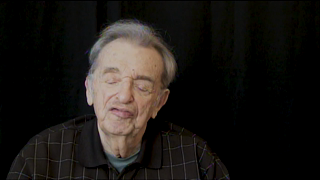4:44 | He's not sure, but Nathan Radin thinks he saw some sumo wrestling going on in the Japanese POW camp across the way. He was in New Guinea and his job was to test the loads of fuel tankers for quality and contamination. The men in the unit had to scrounge for the lumber and build the lab themselves, but at least the Japanese never bothered them. (This interview made possible with the support of KETURAH THUNDER-HAAB.)
Keywords : Nathan Radin petroleum Hollandia New Guinea Finschhafen Papua New Guinea Japanese Prisoner Of War (POW) sumo Douglas MacArthur Lake Sentani Humboldt Bay Philippines Tanahmerah Bay tanker bodies

Nathan Radin felt badly for the natives in New Guinea, who were malnourished and poorly treated by their supposed allies. He succumbed to the environment himself when he contracted Dengue Fever. As he was traveling homeward, the atomic bomb ended the war. With his academic background, he understood immediately when he heard about it. (This interview made possible with the support of KETURAH THUNDER-HAAB.)
With a chemistry degree in hand, Nathan Radin headed home from Berkeley to New York City. He forgot to notify the draft board, but they found him eventually, working for the War Department in a parachute flare factory. (This interview made possible with the support of KETURAH THUNDER-HAAB.)
Most guys were already assigned and shipped out of camp but Nathan Radin found himself in charge of marching new recruits around. Finally, he got an assignment that matched up with his college degree, a medical dispensary in Charleston. Then it was on to a laboratory in Ohio where he trained pilots in a decompression chamber. His eventual wartime assignment was still waiting for him. (This interview made possible with the support of KETURAH THUNDER-HAAB.)
It took a while for the Army to decide how to best use Nathan Radin's chemistry degree. He was assigned to a petroleum products unit which was formed to test tanker loads of fuel for quality and possible reuse. He just missed his deployment when he was delayed by a storm and the man who replaced him probably was headed to a much better place than he was. (This interview made possible with the support of KETURAH THUNDER-HAAB.)
When Nathan Radin got to New Guinea with the Army petroleum products laboratory unit, no one there had any idea who they were or what they were doing there. While that was sorted out, he got to personally know thousands of fuel drums in the depot. When the operation moved around the coast, he was issued the dreaded D ration for the duration of the trip. (This interview made possible with the support of KETURAH THUNDER-HAAB.)
The men at the Army petroleum testing lab hated the food in their own mess hall. Nathan Radin explains that, since they had to board the tankers at anchor to get samples of their cargo, it made since to visit at lunchtime. Back at the lab, there was a mysterious project going on for some unknown VIP. (This interview made possible with the support of KETURAH THUNDER-HAAB.)
He was a non-combatant, but Nathan Radin saw the consequences of war up close, a toll on both human bodies and the environment. He looks back and wonders how it happened and how it could be happening still. (This interview made possible with the support of KETURAH THUNDER-HAAB.)